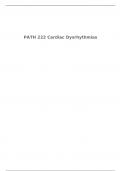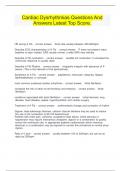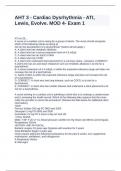Cardiac dysrhyth - Study guides, Class notes & Summaries
Looking for the best study guides, study notes and summaries about Cardiac dysrhyth? On this page you'll find 510 study documents about Cardiac dysrhyth.
Page 4 out of 510 results
Sort by
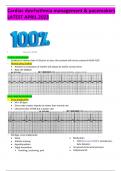
-
Cardiac dysrhythmia management & pacemakers LATEST APRIL 2023 Cardiac dysrhythmias
- Exam (elaborations) • 18 pages • 2023
-
- $7.99
- + learn more
Cardiac dysrhythmia management & pacemakers LATEST APRIL 2023 Cardiac dysrhythmias − Students to review slides 4-29 prior to class: this content will not be covered in NUR 4120 − Normal sinus rhythm • Answers to evaluation of rhythm will always be within normal limits • Rate: 60-100bpm Sinus node dysrhythmias − Sinus bradycardia • HR < 60 bpm • Sinus node creates impulse at slower than normal rate • Characteristics of NSR but a slower rate − Etiology: sinus brady...
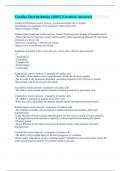
-
Cardiac Dysrhythmias (100% Errorless Answers)
- Exam (elaborations) • 15 pages • 2024
-
Available in package deal
-
- $11.49
- + learn more
Cardiac Dysrhythmia correct answers -An abnormal heart rate or rhythm -Disturbance or irregularity in the electrical system of the heart -May be benign or lethal Athletic Heart Syndrome correct answers -Results from long-term training of the heart muscle -Allows the heart to beat more slowly and forcefully while maintaining adequate CO and tissue perfusion at a slower rate -May have a heart beat < 60 beats per minute -Some as low as 44-48 beats per minute Properties of Cardiac Cell...
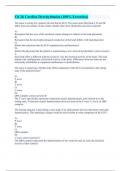
-
Ch 26 Cardiac Dysrhythmias (100% Errorless)
- Exam (elaborations) • 14 pages • 2024
-
Available in package deal
-
- $11.49
- + learn more
The nurse is caring for a patient who has had an ECG. The nurse notes that leads I, II, and III differ from one another on the cardiac rhythm strip. How should the nurse best respond? A) Recognize that the view of the electrical current changes in relation to the lead placement. B) Recognize that the electrophysiological conduction of the heart differs with lead placement. C) Inform the technician that the ECG equipment has malfunctioned. D) Inform the physician that the patient is ex...
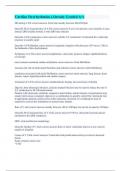
-
Cardiac Dysrhythmias (Already Graded A+)
- Exam (elaborations) • 13 pages • 2024
-
Available in package deal
-
- $10.39
- + learn more
HR during A Fib correct answers Atrial rate usually between 400-650/bpm Describe ECG characteristics of A Fib correct answers P wave not present; wavy baseline is seen instead. QRS usually normal, a wide QRS may indicate Describe A Fib conduction correct answers variable AV conduction; if untreated the ventricular response is usually rapid. Describe A Fib Rhythm correct answers irregularly irregular with abscence of P waves. (This is the hallmark of this dysrhythmia). Symptoms of A F...
PATH 222 Cardiac Dysrhythmias (Arrhythmias)
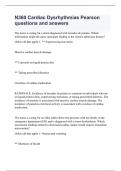
-
N360 Cardiac Dysrhythmias Pearson questions and answers
- Exam (elaborations) • 13 pages • 2024
-
Available in package deal
-
- $12.49
- + learn more
The nurse is caring for a client diagnosed with torsades de pointes. Which information might the nurse anticipate finding in the client's admission history? (Select all that apply.) - ** Experiencing starvation Massive cardiac muscle damage ** Currently on liquid protein diet ** Taking prescribed diuretics Overdose of cardiac medication RATIONALE: Incidence of torsades de pointes is common in individuals who are on liquid protein diets, experiencing starvation, or taking prescri...
Cardiac Dysrhythmias Questions And Answers Latest Top Score.
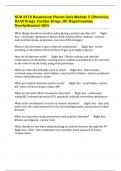
-
NUR 2474 Rasmussen Pharm Quiz Module 5 (Diuretics, RAAS Drugs, Cardiac Drugs, HF, Hypertension, Dysrhythmias)-Q&A
- Exam (elaborations) • 9 pages • 2024
-
Available in package deal
-
- $9.99
- + learn more
NUR 2474 Rasmussen Pharm Quiz Module 5 (Diuretics, RAAS Drugs, Cardiac Drugs, HF, Hypertension, Dysrhythmias)-Q&A
AHT 3 - Cardiac Dysrhythmia - ATI, Lewis, Evolve. MOD 4- Exam 1
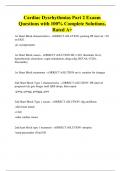
-
Cardiac Dysrhythmias Part 2 Exaam Questions with 100% Complete Solutions, Rated A+
- Exam (elaborations) • 9 pages • 2024
-
Available in package deal
-
- $13.99
- + learn more
1st Heart Block characteristics - cORRECT sOLUTION -prolong PR interval >.20 on EKG. -pt. asymptomatic 1st Heart Block causes - cORRECT sOLUTION MI, CAD, rheumatic fever, hyperthyroid, electrolyte, vagal stimulation, drugs (dig, BETAS, CCB's, Flecainide) 1st Heart Block treatments - cORRECT sOLUTION no tx. monitor for changes 2nd Heart Block Type 1 characteristics - cORRECT sOLUTION -PR interval progressively gets longer until QRS drops, then repeat -going, goingg, goinggg, gone ...

Study stress? For sellers on Stuvia, these are actually golden times. KA-CHING! Earn from your study resources too and start uploading now. Discover all about earning on Stuvia

